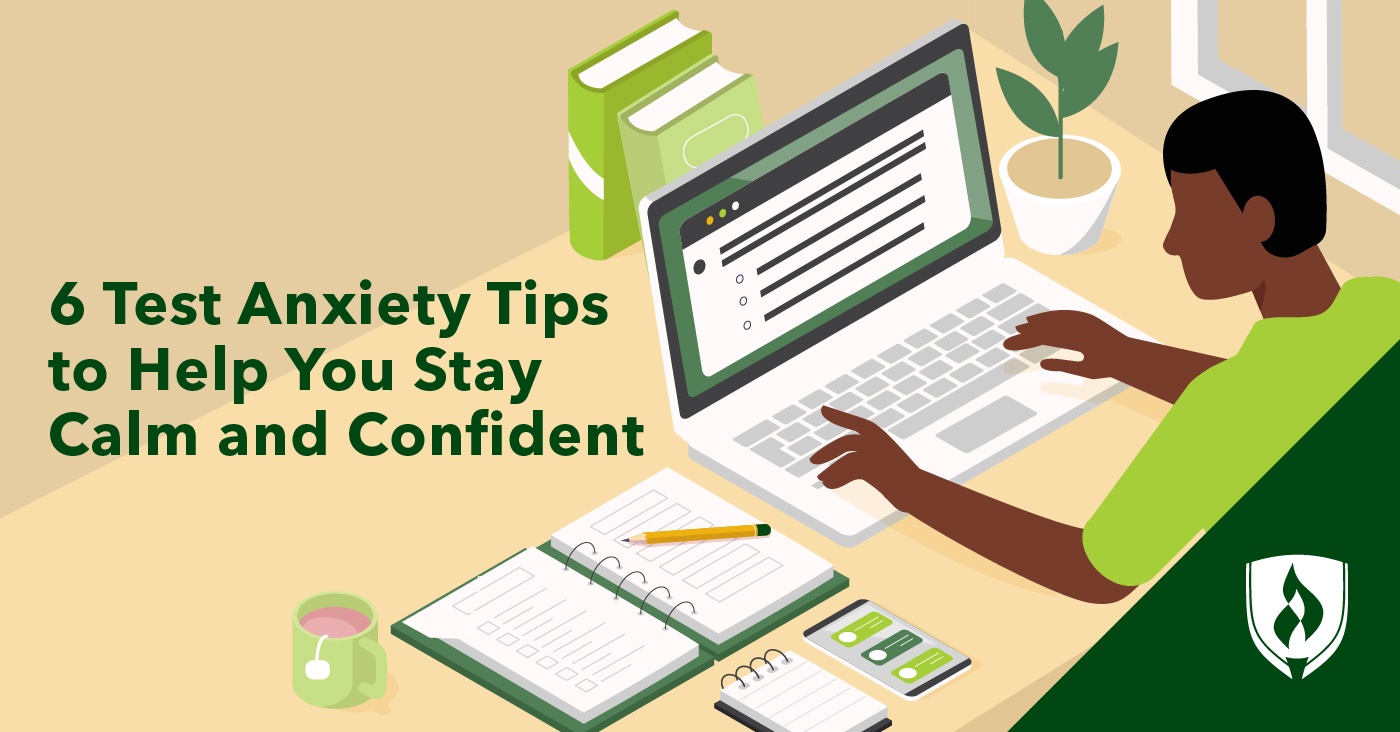
Your love of learning is one of the biggest reasons you’ve decided to pursue a degree. What could be better than expanding your knowledge of a subject you love? There’s just one thing putting a damper on your excitement: tests and the overwhelming anxiety that accompanies them. So is there anything you can do to help with this predicament?
We spoke to experts to round up a few tips to help you break through the nerves, so you can pass each test without fear and get back to the part of college you love best: learning.
What is test anxiety?
“Test anxiety is extreme nervousness before taking an exam that is out of proportion to the test itself,” explains Katie Lear, a licensed therapist.
This form of anxiety has different triggers for everyone, including fear of failure and associating self-worth with test performance.
“For some, test anxiety may show up as an increased heart rate, overthinking, sweating and catastrophizing,” says Hala Abdul, a psychotherapist at Hala Therapy and Counseling. “For others, it might be more procrastination, trying not to think of the test altogether and feeling numb.”
What causes test anxiety?
In some ways, test anxiety is a natural response, one that can even be positive, according to Lear.
“Many of us experience a little nervousness before a test, and this can actually be helpful,” Lear explains. “The surge of adrenaline gives us energy and helps us focus. True test anxiety interferes with the test-taker’s ability to reach their full potential.”
Just seeing an upcoming test on the calendar can trigger anxiety for many people.
“When we anticipate something, the body responds to it as though it’s actually happening in that given moment,” Abdul says.
Having a diagnosis of general anxiety is also a factor for people with test anxiety.
“Anyone with a history of other kinds of anxiety has an increased likelihood of developing test anxiety, too,” Lear says. “People who struggle with perfectionism are also likely to feel a lot of pressure and potentially set unrealistic expectations for themselves. Some people with test-taking anxiety may struggle with the experience of performing the task while being watched by others, which is actually a type of social anxiety. Finally, learning differences, ADHD and executive functioning struggles can all cause added strain for students, which may also worsen test anxiety.”
Types of test anxiety
Karen Southall Watts, a professor and business coach at Karen Southall Watts, offers two different sources of test anxiety: perception and preparation.
Preparation-based test anxiety is a worry that Southall Watts classifies as generally good.
“When students have not read assignments, done practice problems or studied for a test and they are worried about poor performance, this is their brain trying to help them,” Southall Watts says.
But perception-based anxiety is generally an out-of-proportion response toward the test at hand.
“Students with a perception-based anxiety are fearful of being evaluated and may have internalized negative messages like ‘I’m not good at math’ or ‘my writing is sloppy,’” Southall Watts explains. “Their fear and nervousness about test performance is often divorced from their actual mastery of a topic.”
The good news is you don’t have to suffer through a college career marred by test anxiety. Use these expert tips to overcome test anxiety by knowing what to do both before and during the test.
Test anxiety tips: What to do before the test
There are lots of things you can do prior to a test to help calm test anxiety, including making a plan, breathing and relaxation exercises, and talking through test material with others.
1. Make a plan
Creating a plan will give you confidence that you have time to review all the necessary material. You can also block off extra time to focus on the topics that are hardest for you. Strong preparation, while not a direct answer for day-of anxiety, can be a confidence booster that may help keep anxiety-based self-doubt at bay.
Part of your plan can include letting your professors know about your test anxiety.
“If your anxiety is severe, you may be entitled to accommodation through your accessibilities program,” Southall Watts says.
Abdul echoes reaching out for support. “Ask for help if you need to,” she says. “It’s okay to get some support from a classmate, a TA or your instructor.”
Abdul also recommends your plan match up with your own personal rhythms.
“If you’re a morning person, you might want to carve out morning hours to study, and if you’re a night owl, you can do the opposite,” Abdul suggests. “If you do best when you study well ahead of time, plan accordingly. If your performance is better if you just study closer to the date, then go with that.”
Another simple but important tip from Southall Watts when it comes to planning?
“Make sure you’ve clarified all the logistics, like time and whether you can go back to questions on computer-based tests,” Southall Watts says. Writing down the time and place of your exam as well as how much of a percentage the test will be of your grade is also a good clarifying exercise.
2. Remember to breathe and relax
Finding ways to practice daily relaxation can help soothe anxiety during stressful times, such as finals week, says Lear. Breathing exercises and meditation are great ways to do this, but you can think outside the box on coping skills, too. Daily movement, spending time with a friend or expressing yourself through a creative outlet all count as relaxation.”
To reduce overall anxiety and get in the habit of pausing to breathe, Southall Watts recommends practicing the tense and release stress reduction technique.
When you feel your anxiety beginning to build, tighten all your muscles from your toes to your scalp and then let them go all at once, Southall Watts says.
If you need some ideas for other calming techniques, there are many free phone-based apps like Calm or Headspace that offer guided meditation and breathing exercise instructions, too. Plus, both have sleep stories and music to help you get good rest.
3. Talk through your test material
Rote memorization and reading information over and over can only get you so far, especially if you have trouble concentrating before a test. Sometimes, it’s a good idea to review the test material with another person, such as a classmate enrolled in the same course or a Peer Tutor with experience in your field of study.
As with all anxiety, keeping your worries to yourself can make the overwhelming feelings worse. Get together with a group of friends to quiz each other, game-show style, or take turns running through different concepts that will be on the test. Review and take practice tests together and discuss the results. Making the experience positive with others can help reassure you that you’ve got this.
Test anxiety tips: On the day of the exam
On test day, our experts recommend getting good sleep and eating healthy, going easy on the caffeine and slowing down to breathe and move through the material.
4. Put your health first
You’ll feel more mentally prepared if your basic physical needs have been met. A good night’s sleep should be a priority, as is a healthy breakfast.
Anxiety-induced nausea may entice you to skip eating altogether, but it’s important to resist that feeling. Drinking plenty of water can keep your stomach from feeling sour.
“Go into tests well-rested with a high-protein but not overly filling meal in your stomach and the normal amount of caffeine you’d consume on any other day,” Southall Watts suggests. “Exam day is not the time to binge on coffee or energy drinks or to try a ‘cold turkey’ change in habits.”
5. Go easy on the caffeine
Not only can too much coffee the night before interfere with good sleep, but it can also increase anxious feelings.
“Be mindful of your caffeine consumption,” says Abdul. “As helpful as caffeine can be, it can actually cause your anxiety to spike.”
6. Slow down
Take a few deep breaths if you find yourself starting to rush. Keeping at a measured, slow pace helps your brain and body stay calm as you move through the exam material. Rushing only amps up your body’s tension and stress.
“You need to calm down your nervous system so that you can get out of survival mode and rather into the present moment,” says Abdul. “This can be done by deep breathing—simply focusing on inhaling from your nose and exhaling from your mouth while focusing on your breath. Give it a try, say for 30 seconds, and then see how your body feels.”
This can also be a good time to put a guided meditation into practice. You might lose a few moments of test time, but the calm and confidence you’ll gain will be worth it.
Lear recommends simple grounding exercises to help you find calm in the moment.
“Direct attention back to the here-and-now, rather than worrying about the future outcome of your test, by focusing on sensory information in the room around you,” Lear says. “Challenge yourself to count how many red objects you can find in the room or notice how many sounds you can hear around you. The 5-4-3-2-1 is a popular sensory grounding tool (https://www.urmc.rochester.edu/behavioral-health-partners/bhp-blog/april-2018/5-4-3-2-1-coping-technique-for-anxiety.aspx), which challenges you to notice 5 things you can see, 4 things you can touch, 3 things you can hear, 2 things you can smell and 1 thing you can taste.”
Tackle your next test with confidence
Now you’re ready to put these test anxiety tips into play, so you can ace your next exam and get back to the learning you enjoy most.
Overcoming test anxiety begins long before the big day. Plan ahead and leave enough time to prepare by checking out our article “7 Effective Time Management Tips for College Students.”




